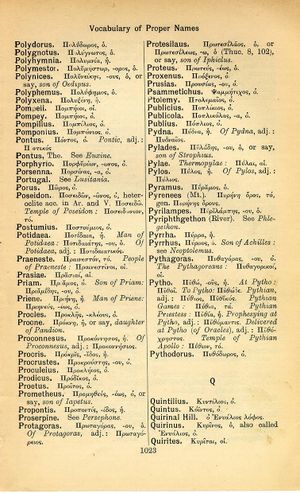Polyxena
ἀλλὰ διὰ τῆς ἀγάπης δουλεύετε ἀλλήλοις. ὁ γὰρ πᾶς νόμος ἐν ἑνὶ λόγῳ πεπλήρωται, ἐν τῷ Ἀγαπήσεις τὸν πλησίον σου ὡς σεαυτόν → but be enslaved to each other through love; for the whole Torah is fulfilled in one statement: You will love your neighbor as yourself (Galatians 5:13f.)
English > Greek (Woodhouse)
Πολυξένη, ἡ.
Latin > English (Lewis & Short)
Pŏlyxĕna: ae, f., = Πολυξένη,
I a daughter of Priam, whom Pyrrhus, the son of Achilles, sacrificed at his father's grave, Ov. M. 13, 448; Juv. 10, 262; Sen. Troad. 368; Hyg. Fab. 110; cf. Verg. A. 3, 321.— Hence,
II Pŏlyxĕnĭus, a, um, adj., of Polyxena, Polyxenian: caedes, Cat. 64, 369.
Latin > French (Gaffiot 2016)
Pŏlyxĕna,¹⁴ æ, f. (Πολυξένη), Polyxène [fille de Priam, immolée sur le tombeau d’Achille] : Ov. M. 13, 448 ; Juv. 10, 262 || -nĭus, a, um, de Polyxène : Catul. 64, 369. -xĕnē Sen. Troad. 376.

